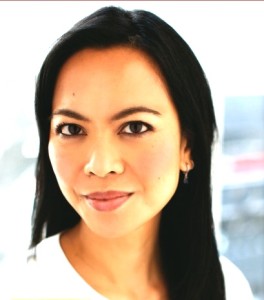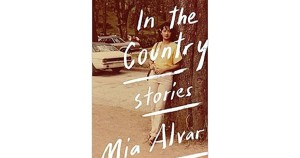Mia Alvar’s debut fiction collection explores the diaspora
Mia Alvar’s debut fiction collection In The Country was ten years in the making, but the wait was worth it.
The New York Times has called her stories remarkable while New York Magazine said her debut collection is so well drawn and plot-rich. Publishers Weekly gave a glowing review and said that the book is stunning; and NPR called her book inspired, and yes, remarkable.
The book won the 2016 PEN/Robert W. Bingham Prize for debut fiction, which honors an exceptionally talented fiction writer whose work—a first novel or collection of short stories—represents distinguished literary achievement and suggests great promise of a second work of literary fiction. And with the award was a $25,000 cash prize for the winner to pursue a subsequent work of fiction.
“I found out that I won during the actual awarding ceremonies, they wanted to keep it exciting. We didn’t know who was going to win. I prepared a little speech, just in case, because I am terrible at speaking off the cuff,” Mia told the Asian Journal in an interview. “It was a great night for Pinoy writers in general, there were several of us who won that night.”
In the Country is an engrossing collection of nine stories, each of them sharing bits and pieces of Filipino culture and history. Her stories are character-driven and are all well crafted and polished.
These are stories from Bahrain, Saudi Arabia and Boston and New York in the United States, three of the many countries Filipinos in the global diaspora call their second home. The protagonists are compelling and complex.
Diaspora is central
“Diaspora is a central part of my family’s experience as it is in many Filipino families’ experience,” Mia explained.
She had an uncle who worked in Saudi Arabia for many years, away from his four children. Her own father lived in Bahrain for many years and for some of those years, their entire family was there with him.
Having a relative who lives or works abroad is common back in the Philippines. It is something that is so familiar to many Filipinos and that was what fascinated Mia and made her ask questions, foremost among them – what happens to family relationships, marriages, parent-child relationships when someone is away for that long?
Overseas Filipino Workers or OFWs have become the new breed of Filipino heroes since they are the ones who work and toil hard abroad, away from their families for extended periods of time. They remit their hard-earned income to their families back home not just for investments for the future but more for their day to day subsistence.
“I think there are a lot of stories in the Philippines about the heroic sacrifices of the OFWs, and these of course are great, significant sacrifices,” Mia said. “In my book, I was more interested in exploring OFWs and immigrant communities as human beings and their flaws and weaknesses as well as their heroic moments.”
Universal stories
It is in the book’s characters, their fears, struggles and successes that remind readers that their stories are universal. And that is also one thing that Mia would like for more people to understand. It has been said that there is a dearth of Filipino authors in America writing about the immigrant experience here.
Mia, a product of both Harvard and Columbia University, begs to differ and says that there’s a lot of them across the United States.
“We’ve been working, some people for generations, what there is a lack of is the right level of visibility and access for these books and the authors. A lot of people just don’t know the names of Filipino authors. Even Filipino Americans sometimes are not that exposed to books about characters and families like theirs,” she explained.
“It really is a matter of getting more of these books into the spotlight and getting mainstream publishers interested in these stories and getting everyone to understand that there are Filipino stories and they are Filipino stories but they are also global and American stories,” Mia added, which is exactly what many readers of In The Country have been posting on various review sites and message boards.
Literary inspirations
Mia has many literary inspirations, among them two Filipinos: one is Paz Marquez Benitez, the first Filipina to publish her short stories in English in the Philippines and the other is Carlos Bulosan, the father of Filipino immigrant literature.
When we asked Mia how long it took her to come up with her first book, she managed a quick laugh and motioned with her two hands. Ten years.
“It was a very long process. It was about ten years and part of that is, I live in New York and we have to make a living while we do our artistic pursuits,” she said with a smile. “I was not writing full time for many of those years and it took a while to get better and get the skills in order for me to finish a lot of these stories.”
Towards the end of those ten years, she was working with an agent and an editor to help speed up the process. Deadlines – a combination of self-imposed and editor/agent-imposed – helped.
“I was ready. I noticed that my mind was moving on to new ideas so I thought, let me just buckle down so I can finish this one and move on,” she said.
Homecoming
Mia went back to the Philippines to promote the book.
“The experience was so wonderful. It was the experience of a lifetime except I don’t want to say that because I want to be back much sooner. It had been 16 years since my last visit so it truly was a homecoming,” she shared, turning a bit wistful.
“My family – my parents traveled with me along with my husband – was talking about how tragically for many immigrant Filipinos it’s a death in the family or an illness that brings them home. This time, it was this joyful, celebratory reason, which was so great,” she said.
Mia was born in Manila and raised in Bahrain and the United States. Her mother’s side of the family is in Manila as well. During her trip, she was able to attend a literary festival in Davao City, where her father’s family is from. She also visited Pangasinan where her husband’s family is from.
To cap her homecoming, they went to Palawan, “which was just an amazing paradise vacation at the end of it all.”
“It expanded my experience of the Philippines in an amazing way and made me want to go back much more often,” Mia quipped.
Nowadays, Mia is working on her next book, which picks up where the end of In The Country leaves off.
“The next one will contain some of the characters. It is going to be about the same issues, the diaspora, immigration, family and all that stuff that Filipinos know a lot about,” she disclosed.









